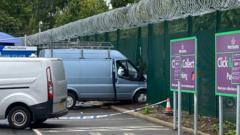Are Moscow Airports in Chaos After Fourth Night of Ukraine Drone Strikes?

Understanding the Current Dynamics of the Russia-Ukraine Conflict
The ongoing Russia-Ukraine conflict has escalated tensions in Eastern Europe and beyond, with recent developments indicating a complex interplay of military actions, diplomatic rhetoric, and the broader implications for global peace. As Russian air defenses claim to have intercepted multiple drones targeting Moscow, the situation continues to evolve, raising questions about the future of negotiations and potential resolutions. This article delves into the latest events, the reactions from both sides, and the broader implications for international relations.
Recent Developments: Drone Attacks and Air Defenses
In a noteworthy incident, Mayor Sergey Sobyanin announced that Russian air defenses successfully shot down at least 16 drones approaching Moscow. This assertion highlights the ongoing threat perceived by Russian authorities and the increasing sophistication of drone warfare being witnessed in the region. Residents in the Kaluga region also reported hearing loud drone activity, further emphasizing the reach and impact of these aerial assaults.
The Russian government's silence on the specific targets or damage caused by these drone attacks is typical of their information strategy during the conflict. This lack of transparency often fuels speculation and anxiety among the populace and international observers alike, as the scale and nature of the threat remain largely unknown.
Ukraine's Tactical Approach
Ukraine's recent drone strikes are indicative of a strategic shift in its military tactics. By employing drones, Ukraine is able to conduct operations with a degree of deniability, complicating Russia's military response. This approach not only disrupts Russian operations but also serves to bolster Ukrainian morale while demonstrating their capabilities to adapt and innovate in the face of adversity.
The Kremlin's Stance on Peace Negotiations
Amidst the military actions, Kremlin spokesperson Dmitry Peskov's statements reflect a dual approach: expressing a willingness to engage in peace talks while simultaneously asserting that President Putin's primary objective remains the attainment of military goals. Peskov noted that the world has become accustomed to the sometimes "harsh" rhetoric of global leaders, including U.S. President Donald Trump, who has also emphasized the importance of seeking a peaceful resolution to the conflict.
The Complexity of Peace Talks
Peskov's comments underscore the intricate nature of the peace process, which he described as a "long process" requiring significant effort. This admission reveals the challenges that lie ahead in reconciling the differing objectives of the two nations. While Russia expresses a desire for a peaceful resolution, the ongoing military engagements suggest that their actions may not align with their words.
International Implications and Reactions
The ramifications of this conflict extend far beyond the borders of Ukraine and Russia. As nations observe the developments, the potential for broader geopolitical shifts looms large. Europe, in particular, remains on high alert, considering the historical context of Russian military actions and the implications for regional security.
The Role of Global Leaders
Global leaders are closely monitoring the situation, with many advocating for diplomatic solutions while reinforcing military alliances. The delicate balance between diplomacy and defense is crucial, as nations navigate their responses to Russia's aggressive posture. The comments from Peskov regarding the U.S. and its approach to negotiations highlight the complexity of international relations in the current climate.
Public Sentiment and Media Reporting
Public sentiment in both Russia and Ukraine plays a significant role in shaping the narrative around the conflict. In Russia, state-controlled media often frames the narrative in a manner that reinforces government positions, while independent media outlets attempt to provide a more nuanced view. In Ukraine, the resilience and determination of the populace are highlighted, showcasing their commitment to sovereignty amid external pressures.
Future Prospects: What Lies Ahead?
As military actions continue and diplomatic dialogues unfold, the prospects for peace remain uncertain. The interplay of military strategy, public opinion, and international diplomacy will significantly influence the course of the conflict. Observers are left pondering the ultimate outcomes and what compromises might be necessary for a lasting resolution.
FAQs
What are the recent developments in the Russia-Ukraine conflict?
Recent developments include Russian claims of shooting down drones heading towards Moscow and ongoing military actions from Ukraine. These events signify an escalation in hostilities and a shift in tactical approaches.
How does the Kremlin view peace negotiations?
The Kremlin expresses a willingness to engage in peace negotiations but maintains that its primary goals in the conflict are yet to be achieved, indicating a complex and possibly contradictory stance.
What are the implications of these events for international relations?
The ongoing conflict has significant implications for international relations, particularly in Europe, where nations are reassessing their security strategies in light of Russia's aggressive actions.
Conclusion: Reflecting on the Path Forward
The Russia-Ukraine conflict continues to evolve, characterized by military engagements and complex diplomatic interactions. As both sides navigate their objectives, the potential for resolution remains a focal point of international concern. The world watches closely, aware that the outcomes of these developments could reshape the geopolitical landscape for years to come. What steps do you think should be taken to foster peace in the region? #RussiaUkraineConflict #InternationalRelations #PeaceNegotiations
Published: 2025-07-20 12:25:10 | Category: News



